You might think that all fertilizers are created equal, but that's simply not the case when it comes to pomegranate trees. Choosing the right fertilizer can greatly impact your tree's growth, fruit quality, and overall yield. With so many options available, it can be overwhelming to narrow them down. However, understanding the unique needs of your pomegranate tree can guide you in selecting the best fertilizers for ideal results. Let's explore the top five fertilizers that can enhance your harvest and help you cultivate a thriving pomegranate tree.
Miracle-Gro 4852012 Fruit & Citrus Plant Food Spikes, 12 per Pack
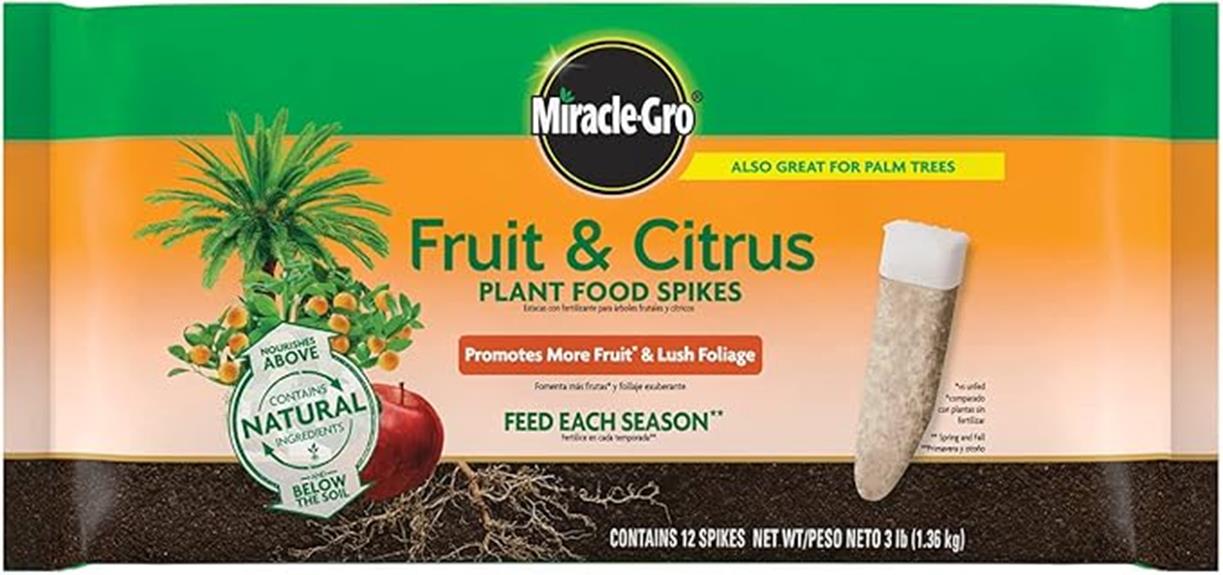
If you're looking for a straightforward way to boost the health and productivity of your pomegranate trees, the Miracle-Gro 4852012 Fruit & Citrus Plant Food Spikes are a top choice. These easy-to-use spikes come in a pack of 12 and provide essential nutrients directly to the root zone, promoting lush foliage and increased fruit production. I've found that applying them in spring and fall yields the best results. Just use a rubber mallet to tap them into moist soil, about three feet from the trunk. Many users, including myself, have noticed remarkable improvements in plant health. With a customer rating of 4.5 stars from over 20,000 ratings, it's clear that these spikes are effective and a great value for any gardener.
Best For: Gardeners looking to enhance the health and fruit yield of their pomegranate, citrus, or palm trees.
Pros:
- Easy application with spikes that release nutrients directly into the root zone.
- Natural ingredients promote healthier plants and more abundant fruit production.
- High customer satisfaction, reflected in a 4.5-star rating from over 20,000 users.
Cons:
- Some users reported broken spikes upon arrival, impacting usability.
- Concerns about the durability of the protective cap during application.
- May require moist soil for easier insertion, which could be a limitation in dry conditions.
Down To Earth All Natural Fertilizers Organic Fruit Tree Mix 6-2-4, 5lb
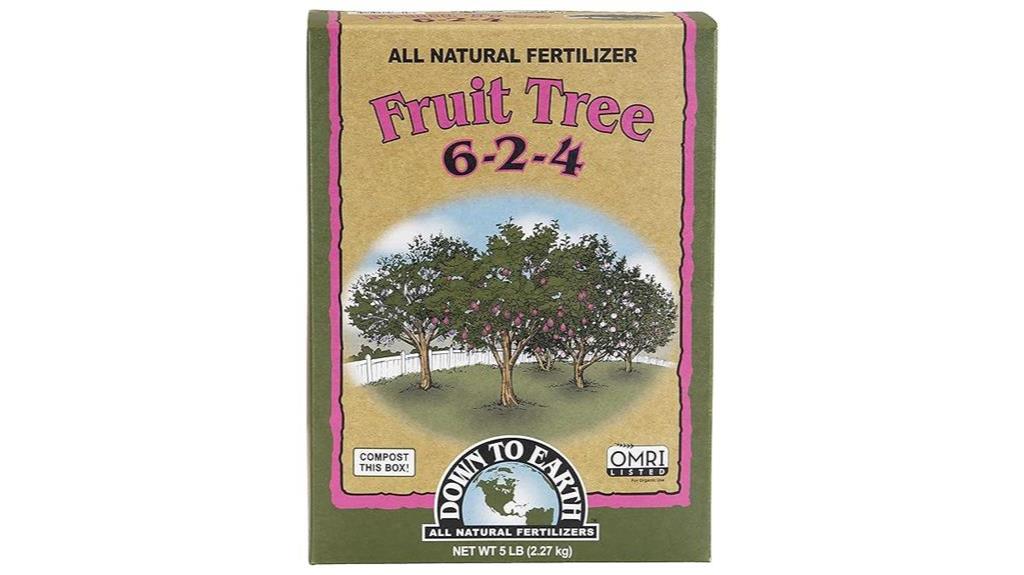
For anyone looking to boost the health and productivity of their pomegranate trees, Down To Earth All Natural Fertilizers Organic Fruit Tree Mix (6-2-4 formula) stands out as an excellent choice. This 5-pound box is OMRI listed for organic production, making it a safe option for home orchards. It provides essential nutrients like nitrogen, phosphorus, and potassium, along with added calcium, which is vital for fruit development. I've found that applying two bags for one tree and one bag for another yields impressive results. Users rave about the transformation of their trees, with one even reporting their largest apple harvest ever. Pairing it with other Down to Earth products can further enhance your pomegranate yield, even in challenging weather.
Best For: Home orchard enthusiasts looking to enhance the health and fruit production of their trees organically.
Pros:
- OMRI listed for organic production, ensuring safety for edible plants.
- Provides essential nutrients (N-P-K) and added calcium for improved fruit development.
- Positive user experiences report significant improvements in tree health and fruit quality.
Cons:
- Requires multiple bags for optimal results, which may be costly for some users.
- Specific application amounts may be confusing for first-time users.
- Limited to fruiting trees and may not be suitable for all plant types.
Pomegranate Liquid Fertilizer for Plants
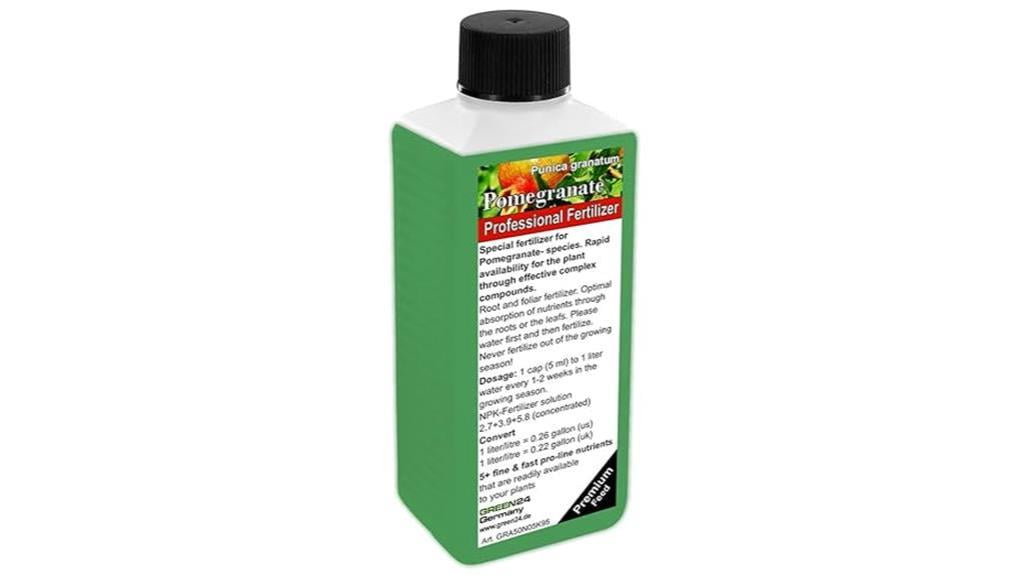
Pomegranate Liquid Fertilizer is the ideal choice for anyone looking to enhance the growth of their Punica granatum trees. Made in Germany as part of the GREEN24 PROFI LINE, this 250 ml concentrate is both economical and effective. I love how it promotes healthy, bright green leaves and stable branches while ensuring strong bud formation and balanced rooting. The rapid effects are impressive; you can apply it through the roots or as a foliar spray. With high-quality raw materials, it guarantees excellent nutrient absorption. Plus, it's tailored for over 100 plant species, so I can use it across my garden. Customers rave about increased growth and flowering, making it a worthy investment despite some delivery delays.
Best For: gardeners and plant enthusiasts looking to enhance the growth and health of their Punica granatum trees and other plants.
Pros:
- Promotes healthy, bright green leaves and strong bud formation.
- Rapid effects with versatile application methods (roots or foliar).
- Tailored nutrient composition suitable for over 100 plant species.
Cons:
- Higher price point compared to some other fertilizers.
- Some customers experience longer delivery times.
- May require careful dosage adjustment based on specific plant needs.
Farmers Secret Fruit Tree Booster Fertilizer (8oz)
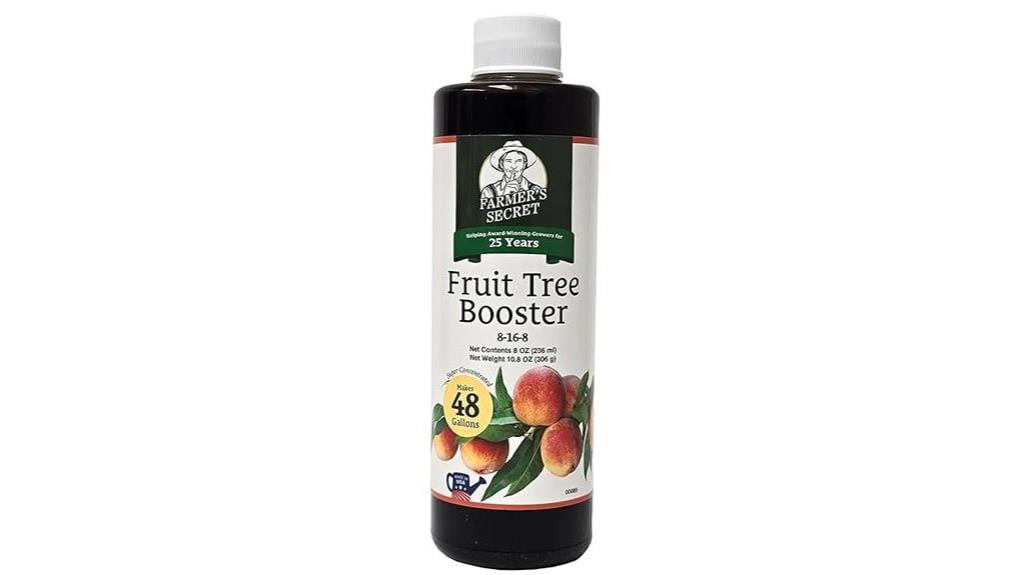
Farmers Secret Fruit Tree Booster Fertilizer (8oz) stands out as an excellent choice for gardeners enthusiastic to promote robust growth in their fruit trees, especially during critical early growth stages. This super concentrated, phosphorus-rich formula caters to all fruit trees, including pomegranates, and it's designed to deliver ideal nutrition when it matters most.
I love how easy it is to use—just dilute one teaspoon in a gallon of water and apply weekly along the drip line. I've noticed significant improvements in tree health and vigor within weeks, with lush foliage and increased fruit production. While some users have mentioned concerns about the bottle's durability, I find this booster a convenient option for enhancing the health of my fruit trees.
Best For: Gardeners looking to enhance the growth and fruit production of their fruit trees, particularly during early growth cycles.
Pros:
- Super concentrated formula allows for economical use and easy storage.
- Phosphorus-rich composition promotes optimal health and vigor in fruit trees.
- Users report rapid improvements in tree health, including lush foliage and increased fruit yield.
Cons:
- The bottle may not be durable, with potential breakage if dropped.
- Intended for tree use only, not suitable for small plants.
- Requires weekly application, which may be a commitment for some gardeners.
Farmer's Secret Fruit & Bloom Booster Fertilizer (16oz)
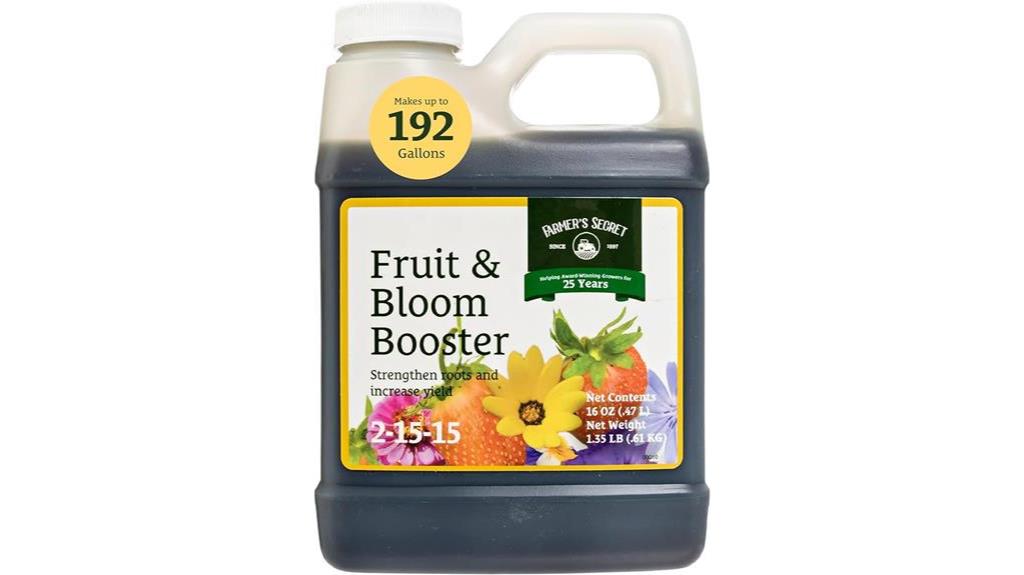
Looking to boost your garden's productivity? I highly recommend Farmer's Secret Fruit & Bloom Booster Fertilizer. This super concentrated 16 oz liquid fertilizer is perfect for all varieties of fruits, vegetables, and flowers, especially during late summer and early fall. I love how easy it is to use—just dilute 1 teaspoon in 2 gallons of water and apply every 2-4 weeks. I've noticed significant improvements in flowering and yield, thanks to stronger roots and better nutrient uptake. It works wonders on pomegranate trees, as well as citrus, tomatoes, and even roses. With an impressive average rating of 4.5 stars, many gardeners echo my experience. Just keep in mind the plastic packaging and varying results on some plants.
Best For: Gardeners looking to enhance the productivity and flowering of a variety of fruits, vegetables, and flowers, particularly during late summer and early fall.
Pros:
- Easy to use: Simple dilution process and application every 2-4 weeks.
- Versatile: Effective on a wide range of plants, including citrus trees, tomatoes, and roses.
- Positive feedback: High average rating of 4.5 stars from numerous satisfied users.
Cons:
- Plastic packaging concerns: Some users have criticized the use of plastic materials.
- Varying results: Effectiveness may differ across different plant types.
- Limited volume: At 16 oz, it may not last long for larger gardens.
Factors to Consider When Choosing Fertilizers for Pomegranate Trees
When choosing fertilizers for your pomegranate trees, you need to contemplate several key factors. The nutrient composition plays a vital role, along with the choice between organic and synthetic options. Additionally, understanding your soil's pH and the plant's growth stage will help you apply the right fertilizer at the right time.
Nutrient Composition Importance
Choosing the right fertilizer for pomegranate trees hinges on understanding nutrient composition, as these trees thrive on a balanced supply of essential elements. You'll want to focus on key nutrients like nitrogen, phosphorus, and potassium. Nitrogen supports vigorous growth, while phosphorus is vital for enhancing flowering and fruit set, especially during the early stages of development.
Don't overlook the importance of micronutrients such as calcium and magnesium. These elements play a significant role in proper fruit development and overall plant health, so make sure your chosen fertilizer includes them. Regular applications with the right nutrient mix can lead to increased yields and improved fruit quality.
When considering your options, keep in mind that organic fertilizers often contain beneficial components like kelp meal and fish bone meal. These not only provide a slow-release nutrient source but also contribute to better soil health. By understanding these nutrient needs and choosing a fertilizer that meets them, you'll set your pomegranate trees up for success. Remember, a well-nourished tree is more likely to produce abundant, high-quality fruit.
Organic vs. Synthetic Options
Understanding the nutrient needs of your pomegranate trees naturally leads to the question of whether to opt for organic or synthetic fertilizers. Organic fertilizers, derived from plant or animal sources, provide essential nutrients without harmful chemicals. They promote healthier soil and encourage beneficial microorganisms, which can enhance your garden's ecosystem. On the other hand, synthetic fertilizers often contain higher concentrations of nutrients, allowing for rapid absorption by your trees. However, they may contribute to soil degradation and water pollution over time.
When considering organic options, you'll find that their nutrient composition releases more slowly, resulting in sustained growth and a reduced risk of nutrient burn. Additionally, organic fertilizers tend to be rich in secondary nutrients and micronutrients, bolstering your pomegranate trees' overall health and resilience against pests and diseases.
Ultimately, your choice may depend on your trees' specific nutritional needs, local regulations, and your personal gardening philosophies about sustainability and environmental impact. Weighing the pros and cons of both organic and synthetic fertilizers guarantees you make an informed decision that aligns with your gardening goals.
Application Frequency Guidelines
To guarantee your pomegranate trees thrive, it's crucial to follow a proper fertilization schedule. Generally, you should fertilize your trees two to three times a year. Aim for applications in early spring, mid-summer, and late summer to support their growth and fruit development.
It's best to apply fertilizers when the soil is moist. This practice enhances nutrient absorption and minimizes the risk of root damage. In the first year, your young trees may need less frequent feeding compared to mature ones, as the focus should be on establishing a strong root system.
Consider using slow-release fertilizers, as they provide a steady supply of nutrients over time, reducing the need for frequent reapplication. Keep an eye on your trees' growth and fruit production. Monitoring these factors can help you determine if your fertilization schedule is effective or if adjustments are necessary.
Soil Ph Considerations
When it comes to fertilizing pomegranate trees, soil pH plays an essential role in ensuring ideal nutrient availability and overall plant health. Pomegranate trees thrive in slightly acidic to neutral soil, with a pH range of 5.5 to 7.0 being most favorable for healthy growth and fruit production. If your soil's pH is above 7.0, essential nutrients like iron and manganese may become less available, potentially hindering your tree's performance.
To maintain the right pH levels, regular soil testing is key. This will help you determine if any amendments are needed to create the best growing conditions. If your soil is too alkaline, you can lower the pH by adding organic matter or sulfur. Conversely, if your soil is overly acidic, lime will help raise the pH.
Plant Growth Stage
Choosing the right fertilizer for pomegranate trees depends greatly on their growth stage. Young trees need fertilizers that focus on promoting root development and overall plant vigor. This foundational growth is essential for establishing a strong tree. During the vegetative growth phase, opt for fertilizers with higher nitrogen levels to encourage lush foliage and healthy growth.
As your pomegranate trees shift to the flowering stage, switch to fertilizers rich in phosphorus. This nutrient is important for enhancing bud formation and improving fruit set, ensuring a bountiful harvest. Once your trees reach maturity, balanced fertilizers containing micronutrients become significant. They support sustained fruit production and maintain the overall health of your trees.
Additionally, regular soil testing can help you pinpoint specific nutrient needs at each growth stage. By understanding what your pomegranate trees require, you can implement targeted fertilization strategies. This approach not only optimizes growth but also maximizes your harvest. Remember, choosing the right fertilizer at the right time can make a significant difference in the productivity and health of your pomegranate trees.
Environmental Impact Awareness
Environmental impact plays an essential role in selecting fertilizers for your pomegranate trees. When choosing fertilizers, consider their composition. Organic options generally have a lower ecological footprint compared to synthetic fertilizers, which can degrade soil health and contribute to water pollution. Nutrient runoff from these synthetic fertilizers often leads to eutrophication, causing harmful algal blooms that disrupt aquatic ecosystems and threaten fish populations.
Be wary of fertilizers containing heavy metals or persistent chemicals, as these can accumulate in the soil and potentially enter the food chain, posing risks to both human health and biodiversity. Instead, opt for sustainable practices like using compost or natural amendments. These not only enhance soil health and improve water retention but also reduce the need for chemical inputs, benefiting both your trees and the environment.
Lastly, consider the carbon footprint of fertilizer production and transportation. By choosing locally sourced and sustainably produced fertilizers, you can minimize environmental harm while giving your pomegranate trees the nutrients they need to thrive. Making informed choices about fertilizers will help you promote a healthier ecosystem alongside a bountiful harvest.
Compatibility With Other Plants
Selecting the right fertilizer for your pomegranate trees involves considering how it interacts with neighboring plants. Pomegranate trees thrive in nutrient-rich soil, so you'll want to guarantee that any fertilizer you choose doesn't negatively affect the overall soil ecosystem or nearby plants. The nutrient composition of the fertilizer is essential; selecting a balanced formulation will help both your pomegranates and companion plants flourish.
Be mindful that some fertilizers might contain high levels of specific nutrients, which can lead to imbalances in the soil, potentially harming surrounding plants. When fertilizing your pomegranate trees, consider the growth requirements of nearby plants. For instance, heavy feeders may compete for nutrients, while drought-tolerant species might not benefit from the extra watering that comes with certain fertilizers.
Opting for organic fertilizers can often be a smart choice, as they promote healthier soil microbiomes. This not only aids your pomegranates but also enhances nutrient availability and uptake for a wider range of plants. By keeping compatibility in mind, you'll create a thriving garden that benefits all your plants, not just your pomegranate trees.
Frequently Asked Questions
How Often Should I Fertilize My Pomegranate Tree?
You should fertilize your pomegranate tree about three to four times a year. Start in early spring when new growth begins, then continue every couple of months until late summer. Use a balanced fertilizer, and make sure to follow the recommended application rates. Keep an eye on your tree's growth and health; if it shows signs of nutrient deficiency, you might need to adjust your fertilization schedule. Happy gardening!
Can I Use Compost as a Fertilizer for Pomegranate Trees?
Just like a wise gardener nurtures their soil, you can definitely use compost as a fertilizer for your pomegranate trees. Compost enriches the soil with essential nutrients and improves its structure, promoting healthy root growth. It's a natural way to feed your trees, allowing them to thrive without chemical additives. Just be sure to mix it well into the soil during the growing season, and you'll see your pomegranate trees flourish beautifully!
What Are the Signs of Over-Fertilizing Pomegranate Trees?
When you over-fertilize pomegranate trees, you might notice a few signs. Leaves can turn yellow or brown, indicating nutrient burn. You may also see excessive leaf growth with fewer flowers and fruits, as the tree focuses on foliage instead of fruit production. Additionally, roots can become damaged, leading to poor overall health. If you spot these signs, it's essential to reduce fertilizer application and allow the tree to recover.
Are There Organic Alternatives to Chemical Fertilizers for Pomegranates?
Absolutely, there are several organic alternatives to chemical fertilizers for your pomegranate trees. You can use compost, which enriches the soil with nutrients while improving its structure. Manure is another great option, providing essential nutrients naturally. Fish emulsion and seaweed extracts also work wonders, promoting healthy growth and fruiting. Just remember to apply these organic options in moderation to avoid any nutrient imbalances. Your trees will thrive with the right care!
When Is the Best Time to Fertilize Pomegranate Trees?
The best time to fertilize pomegranate trees is early spring, just as new growth begins. You want to apply fertilizer when the soil temperature warms up, usually around March or April. This timing helps the tree absorb nutrients effectively as it prepares for the growing season. You can also consider a second application in late summer to support fruit development. Just make sure to follow the recommended amounts for best results!
Wrapping Up
By choosing the right fertilizers, you're planting the seeds for a thriving pomegranate harvest. Picture your trees bursting with vibrant fruits, each one a jewel glistening in the sun, thanks to the balanced nutrients these products provide. With Miracle-Gro's spikes and organic blends nurturing your plants, you'll watch as lush foliage and bountiful blooms transform your garden into a lush oasis. Embrace these top picks, and let your pomegranates flourish like a sunset painting the sky.
